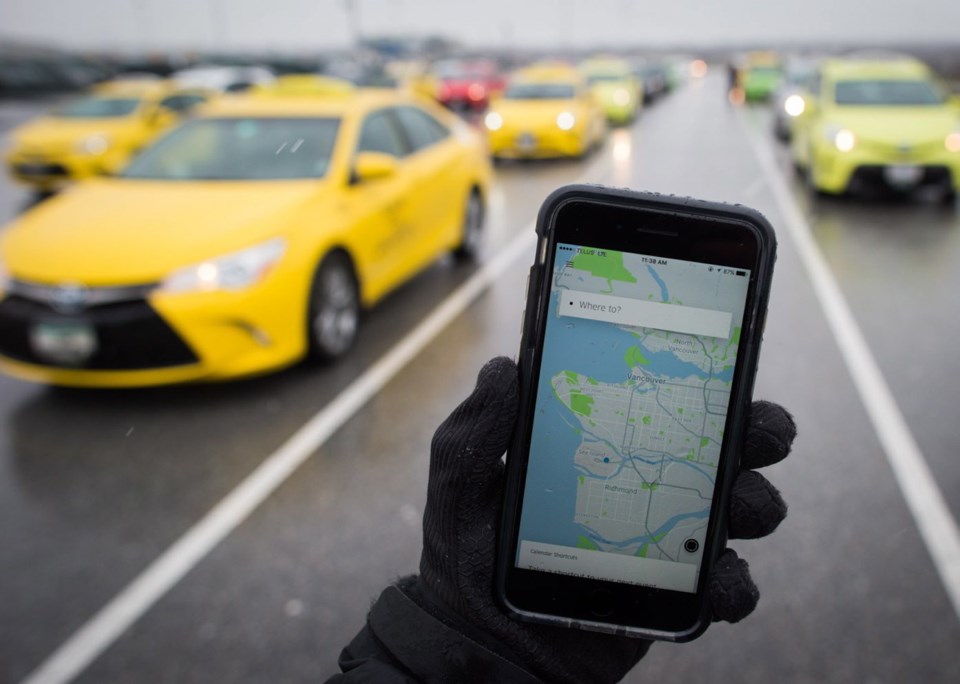 The cabinet ministers sounded terribly earnest Tuesday about being studiously careful, and regulating ride-hailing to ensure the highest standards.
The cabinet ministers sounded terribly earnest Tuesday about being studiously careful, and regulating ride-hailing to ensure the highest standards.
They were quite proud of the fact it took years of deliberations to get to the point of giving the industry the green light.
But when the apps go active in December — depending to some extent on the May election — it’s a safe bet government is going to get left behind. These are huge, cutting-edge companies with multibillion-dollar valuations. They know what they want, and they aren’t shy about going after it.
If a relatively tiny backwater like B.C. gets in the way once they are up and running, they won’t be shy about throwing their weight around. And it’s unlikely the provincial government would do something draconian and rescind permission.
Once the trendy, convenient new system takes hold, who’s going to step up and cancel the future?
The tech industry — and the companies consider themselves high-tech entities, not taxi companies — moves at the speed of light. No one has ever accused government of that. So it won’t be surprising if the companies innovate themselves to an entirely new level, and leave the government scrambling to keep up.
Some of their extraordinarily aggressive business tactics were on display in a New York Times exposé last week about Uber.
The story recounted a “greyball” technique where the company’s technology can identify municipal authorities who try to keep tabs on the firm. Using the usual data wizardry, it blocks them from using the service or learning anything about it.
The full account is a marvel of a company that openly laughs at local regulators. They’re not just evading authorities. They are taunting them.
The story of the industry’s emergence all over the world is a story of companies barging in and forcing their way past local authorities, then running their enterprises mostly as they see fit.
It was striking how much of Tuesday’s announcement was devoted to propping up the old model — the beleaguered, out-of-date taxi business.
The B.C. Liberals will try to placate the cabbies with a $1-million grant to build a provincewide shared dispatch system, something they probably should have done on their own a few years ago. And they will retain exclusive rights to street-hailing, taxi stands and calls by phone. As well, all municipal boundary restrictions on their permits will be erased.
ICBC is fronting another $3.5 million for “crash-avoidance technology” in all B.C. taxis, and is going to streamline insurance coverage to their benefit.
But tucked away in all the taxi improvements was a change that is a huge benefit to the ride-hailing firms.
The government is doing away with the Class 4 driver’s licence. That’s slightly more stringent than the standard licence and is required by taxi drivers. It won’t be required of drivers for ride-hailing firms, so to keep the system fair, the government is eliminating it for everyone.
It’s a break for the taxi industry, but it’s also the one essential move the ride-hailing industry needed before it could open up in B.C.
The business lives or dies on casual, part-time drivers, and insisting on a tougher licence would have limited the available pool.
The government pitched the move as a means of maintaining fair safety standards, without dwelling too much on the fact that the fair standards are lower than the existing ones.
On the political side, the promise of ride-hailing puts the Opposition New Democrats on the spot. The service is hugely popular, and many Vancouverites consider it a point of shame they are the last major city in North America without it.
So the Liberal move will go over well in metro areas.
But the NDP has been suspicious of the technology.
As was Transportation Minister Todd Stone for a while, before being yanked off the file.
NDP Leader John Horgan stood with cabbies against ride-hailing two years ago, saying Uber is inconsistent with regulations to protect travellers.
He might have to change his stance to stay onside with voters keen to order rides on their smartphones.



